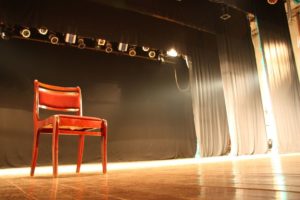Theater Review: Young Jean Lee’s Pullman, WA

I walk into the Woolly Mammoth Theatre in Washington, DC, well-known in the city for its innovative performances, and enter the Melton Rehearsal Hall, an intimate, minimalist space that will serve as the set for playwright Young Jean Lee’s Pullman, WA, presented by the Edge of the Universe Players 2. About forty seats are set up in a circle, with three easels and blank notepads set in its midst. I feel like I’ve entered an Alcoholics Anonymous meeting, and in a way, that’s the play’s intention—to ready ourselves to bare our souls to complete strangers.
After a few minutes of awkward silence during which many of us look around at each other, wondering when the play will begin, a woman (Tia Shearer) sitting just a seat away from me stands up and begins a powerful monologue on “how to live.” But the explanation is not easy to understand, perhaps because there’s no simple answer to such a question. She speaks in a stream of consciousness, draws happy faces on the easel pad, then throws the entire pad in the trash. She points her finger directly at audience members, accusing us of not being who we really are. Eventually, she decides that living boils down to simple things like eating healthy, not smoking, and going to bed early. But we know a good life is far more complicated than that.
As she descends into the realization that the answer is far more complex, another character (Jenna Rossman) emerges, representing the nonsensical part of our brain—she obsesses over unicorns, twirls under an umbrella, and high-fives audience members—and appears to be in complete denial of the serious problems that all humans face. But just as the two actors are about to dig deep and get real, a third person (Drew Kopas) appears, essentially representing religion and its ability to save us all from our pain and suffering. But will giving ourselves to a higher power make us truly happy? What does it even mean to be happy?
Young Jean Lee, who in a 2007 New York Times theater review described herself as a “nonbelieving daughter of Korean-American evangelicals,” and who grew up in the small town of Pullman, Washington, is best known for her experimental plays that explore identity and understanding the self, with elements of religion thrown in. Her first work, Songs of the Dragons Flying to Heaven, which has been praised as a “masterpiece” by the New Yorker, examines what it means to be “authentically” Korean while living in a white-dominated society, while Church is a spiritual revival that appears to both celebrate and criticize the evangelical Christian religion in which she was raised.
The Edge of the Universe Players 2 is committed to “presenting plays that feed the unending human process of thought, hope, and work toward a better world,” according to the company’s chair, Bill Goodman. Three years ago they debuted Atheist’s Paradise, an exploration of atheism and critical thinking in higher education. In Pullman, WA, the cast puts their all into their performances, most notably when Shearer and Rossman interact with each other. A range of emotions—self-doubt, depression, joy, and confusion—are displayed magnificently in the facial expressions and movements of the actors. I’m new to experimental theater, and this was indeed an unforgettable experience. Such avant-garde theater is not for everyone, but we can all relate to the struggle of figuring out, indeed, “how to live.”
Pullman, WA, is playing at the Woolly Mammoth Theater in Washington, DC, through November 20, 2016, and can be viewed in its entirety at youngjeanlee.org.
